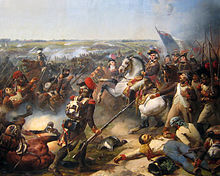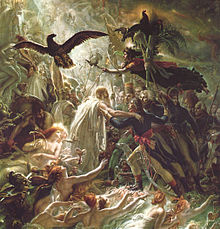Jean-Étienne Championnet
Jean-Étienne Vachier, called Championnet (born April 13, 1762 in Valence , Département Drôme , France , † January 9, 1800 in Antibes , France) was a French Général de division .
Life

Championnet received its first leadership tasks during the First Coalition War in 1793 in the campaigns on the Rhine under General Pichegru and General Hoche . In 1794 he was general de brigade in the Sambre and Maas Army under the high command of Jean-Baptiste Jourdan . In the Battle of Fleurus he successfully led a division in the center. As a general he took part in the conquest of the Rhineland. During the occupation of the Rhineland on October 6, 1794, he was able to take and occupy Cologne without a fight. In 1796 he led units of the right wing of the Sambre and Maas armies on the Middle Rhine and Hunsrück under General Marceau . As division commander he was in Jourdan's campaign against the Austrians under Archduke Karl in Franconia in the summer of 1796 and had to retreat with the army to the left bank of the Rhine after the lost battles at Amberg and Würzburg . In 1797 he was briefly interim commander in chief of the Sambre and Maas armies.
At the end of 1797 he was the general responsible for the purchase of the property and the construction of the Monument General Hoche in Weißenthurm .

In 1798 he became commander in chief of the army that was supposed to protect the Roman Republic against Naples . At first he was expelled from Rome by a five-fold superior force of the Neapolitans , but then defeated the armed forces led by General Karl Mack von Leiberich in December 1798 and captured Capua . On January 23, 1799, he reached Naples again and, after bloody battles, conquered the city, in which (while the fighting) the Parthenopean Republic was proclaimed by Neapolitan patriots , which, however, did not have a long life.
Championnet took measures to end the looting and robbery of the French civil commissioners. This earned him a charge of abuse of office, he was then deposed and held until the coup d'état of June 18, 1799 ( 30th Prairial VII ) freed him again. From September 21st to December 30th, 1799, after the death of General Barthélemy-Catherine Joubert , Championnet Général en chef (Commander in Chief) of the Armée d'Italie , with which he fought against the troops of the second coalition under Field Marshal Lieutenant Michael von Melas . The French were defeated on November 4, 1799 in the Battle of Genola (detailed, English description :) and had to give up their Italian conquests won by Bonaparte in the First Coalition War .
Jean-Étienne Championnet died of an epidemic near Antibes on January 9, 1800 . In the 19th century, the republican-minded patriots of France counted him among the most important revolutionary generals who died prematurely.
Honors
His name is entered on the triumphal arch in Paris in the 3rd column. A memorial was erected to him in Antibes in 1891 .
Individual references / sources
- ^ Arnold Stelzmann, Robert Frohn: Illustrated history of the city of Cologne. Bachem, Cologne 1958, 1990 (11th edition), p. 233f.
- ^ Abel Hugo: France militaire. Histoire des armées de terre et de mer. 1792-1837. Vol. 2, Delloye, Paris 1838 (full text on the Internet at Gallica.bnf.fr).
- ↑ Landeshauptarchiv Rhld.-Pfalz, Koblenz, unprocessed Best. 403, No. 14027 and Best. 256, No. 1701
- ↑ http://www.napoleon-series.org/military/battles/1799/c_1799z32.html
| personal data | |
|---|---|
| SURNAME | Championnet, Jean-Etienne |
| ALTERNATIVE NAMES | Vachier Championnet, Jean-Étienne (full name) |
| BRIEF DESCRIPTION | French general |
| DATE OF BIRTH | April 13, 1762 |
| PLACE OF BIRTH | Valence , Drôme department , France |
| DATE OF DEATH | January 9, 1800 |
| Place of death | Antibes , France |

